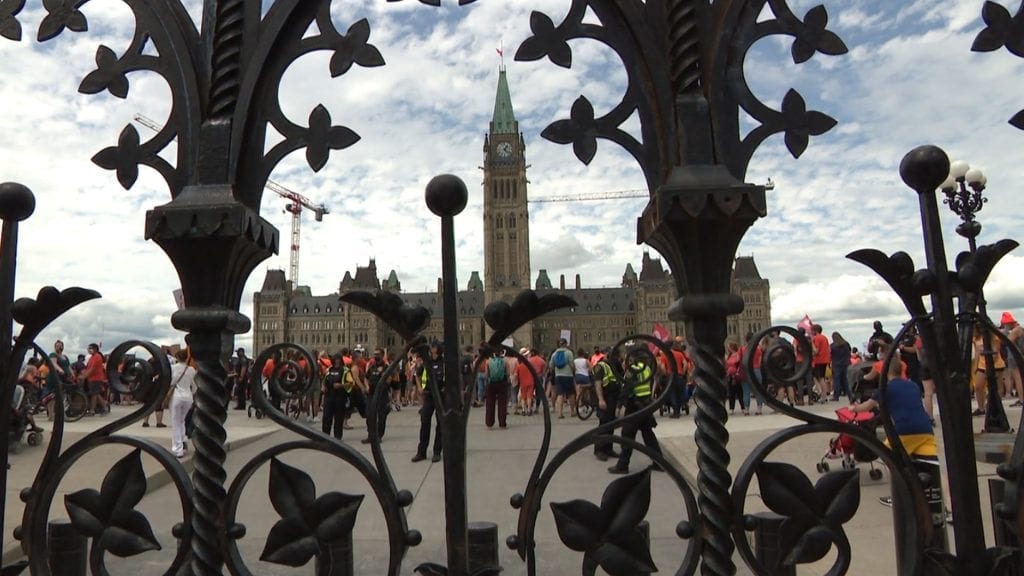
A rally in front of the Peace Tower on Parliament Hill. APTN photo: File
It’s the wrong time to plunge the country into a nationwide election, a number of Indigenous leaders say.
Peter Irniq, a former Inuk politician from Nunavut, is dismayed to see the Trudeau government call a federal vote for Sept 20.
“They’re going ahead despite what people are saying,” Irniq said from his home in Ottawa.
“But this is pandemic, it’s dangerous stuff; this (highly contagious) Delta variant is increasing across the country.”
Chief Todd Peigan of the Pasqua First Nation in Saskatchewan agrees.
Health and safety
He’s sorry the health and safety of Canadians – and Indigenous communities – aren’t coming before Prime Minister Justin Trudeau’s push for a political majority.
“They should have got (the spread of coronavirus) under control, then called the election,” Peigan said in a telephone interview.
Most Indigenous communities, which already experience poor access to healthcare, were hit hard by COVID-19, and many are still recovering.
They suffered numerous COVID-19 outbreaks before vaccines were made available, and variants became an issue.
Nunavut, where Irniq was a former commissioner, closed its borders to successfully, for the most part, keep the infection out.
Federal election
But that’s not possible during a federal election.
“I just don’t feel that this is the right time to call it,” added Jack Anawak, a former Nunavut politician. “Nunavut has no cases right now.
“It just seems like an opportunistic idea to call the election. And use their handling of the pandemic as a reason.”
APTN News polled elected and community Indigenous leaders for their reaction and the response was unanimous.
“It doesn’t need to happen,” said Adam North-Peigan of the Piikani First Nation in southern Alberta.
“The Liberals have two years left in their mandate. They don’t have to call an election till 2023.
“And we’re still in the midst of a pandemic. It’s the fourth wave now, and the (highly infectious) variant is picking up speed.”
Irniq predicts voter turnout will be low as a result.
Unmarked graves
“There’s a lack of interest in elections because of what we’re going through,” he said of the pain caused by recent discoveries of hundreds of unmarked graves at former residential school sites.
The schools – funded by government and run by churches – operated for more than a century as a way to assimilate Indigenous children into colonial society.
“There’s a lot of pressure on the government of Canada to do something about the impact of former residential schools,” said Anawak, noting Indigenous Peoples across Canada need closure and healing.
“And address the (Truth and Reconciliation Commission) recommendations.”
Campaigning will only delay this important work further, agreed Peigan.
Prime minister
“What is the prime minister doing calling a general election now?” wondered North-Peigan. “It shouldn’t be done.”
He said if the Liberals lose and the Conservatives win, support for Indigenous issues could be very different.
“Who’s to say that they’re not going to overturn what is in place now?” he wondered.
“That’s very worrisome for us.”
Chief Peigan said being in power is “seductive” and doesn’t always lead to good decisions.
But Indigenous Peoples are used to dealing with federal impacts and know how to roll with it, he added.
“We’ve made it this far and we’re still here,” he said. “This is another bump.”









